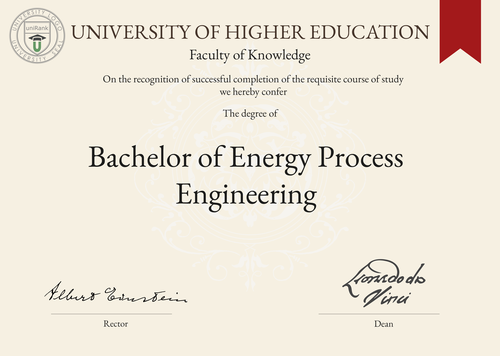
Bachelor of Energy Process Engineering (B.E.P.E.)
Guide to Bachelor of Energy Process Engineering Program/Course/Degree
Bachelor of Energy Process Engineering (B.E.P.E.)

Program Name:
Bachelor of Energy Process EngineeringProgram or Degree abbreviation:
B.E.P.E.Duration range:
The duration of the program typically ranges from 3 to 4 years.Tuition range:
The tuition fees for the program can vary depending on the chosen country or university. It is recommended to check with specific institutions for accurate information.Overview:
The Bachelor of Energy Process Engineering program is designed to provide students with a comprehensive understanding of energy systems and processes. It focuses on the efficient utilization and management of energy resources, renewable energy technologies and sustainable energy practices.Curriculum Overview by year:
- Year 1: Introduction to Energy Engineering, Mathematics for Energy Engineers, Physics for Energy Engineers, Introduction to Thermodynamics. - Year 2: Fluid Mechanics, Heat Transfer, Energy Conversion Systems, Renewable Energy Technologies. - Year 3: Process Control, Energy Management, Energy Economics, Environmental Impact Assessment. - Year 4: Energy Policy and Planning, Energy Project Management, Industrial Training, Final Year Project.Key Components:
The key components of the program include studying energy systems, thermodynamics, fluid mechanics, heat transfer, renewable energy technologies, energy management and project planning.Career Prospects:
Graduates of the Bachelor of Energy Process Engineering program can pursue various career paths in the energy sector. They can work as energy engineers, process engineers, renewable energy consultants, energy analysts, project managers, or researchers in government agencies, energy companies, consulting firms and research institutions.Salary Expectations:
The salary expectations for graduates of the program can vary depending on factors such as the country, industry, job position and level of experience. It is advisable to research specific salary ranges in the desired location and field. For a more accurate understanding of salary expectations, you can utilize the Job Sites Search Engine, from our sister site jobRank, which searches over 4,600 job sites worldwide. Make sure to specify not only the job title but also the country you are interested in.Conclusions:
It is important to note that the duration, tuition fees, curriculum, key components, career prospects and salary expectations of the Bachelor of Energy Process Engineering program can vary. These variations can be influenced by the chosen country or location for studying the program, as well as the chosen university. Prospective students are encouraged to explore different universities and countries to find the best fit for their educational and career goals. Visitors can search for institutions offering the Bachelor of Energy Process Engineering program worldwide through the uniRank World Universities Search Engine.World Universities Search Engine
search for Bachelor of Energy Process Engineering (B.E.P.E.) and add the Location (country, state etc.) or specific University you are interested in studying at.
Query examples:
- Bachelor of Energy Process Engineering (B.E.P.E.) United States
- Bachelor of Energy Process Engineering (B.E.P.E.) United Kingdom online
- Bachelor of Energy Process Engineering (B.E.P.E.) Australia international students
- Bachelor of Energy Process Engineering (B.E.P.E.) University of California
- Bachelor of Energy Process Engineering (B.E.P.E.) University of London tuition fees
- Bachelor of Energy Process Engineering (B.E.P.E.) University of Sydney scholarships
Share Program/Course
Interesting? Share this program/course/degree info with your friends now.